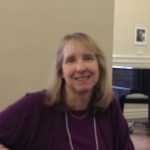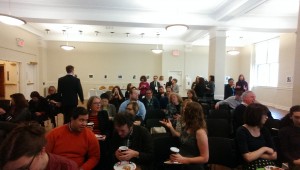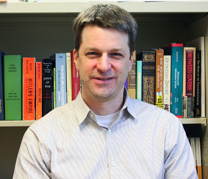I, along with Valori Banfi attended Beyond the Search I: Protocol Development and Methodology for Systematic Reviews.
This webinar, held on October 22, 2014, was part of the continuing education program of the Medical Library Association. The webinar was hosted for New Englanders at the Lamar Soutter Library of the University of Massachusetts Medical School but was conducted by two informationists from the University of Michigan Ann Arbor. Each presenter, Mark MacEachern and Whitney Townsend, has authored several systematic reviews.
The goal of the webinar was to provide the audience with the tools to develop protocols for systematic reviews. Systematic reviews are a type of publication frequently seen in medicine. They are also becoming popular in other fields concerned with treatment outcomes, such as psychology and health communication. Systematic reviews “attempt to collate all empirical evidence that fits pre-specified eligibility criteria in order to answer a specific research question” (Higgins & Green, 2011). A protocol is simply is a plan that explains how a systematic review will be conducted. As such the protocol is outlined before the review begins.
Why establish a protocol? Systematic reviews are meant to be comprehensive and exhaustive, which means they take a long time to complete. Many systematic review standards (Institute of Medicine, 2011; Liberati et al, 2009) recommend protocols in order to notify the research community about a forthcoming systematic review on a topic. This helps to prevent a duplication of effort. Protocols also serve as a means to reduce bias ex post facto. The presenters recommended several online templates for protocol-building and suggested registries where protocols can be filed.
Besides this helpful advice, the webinar also focused on how to communicate with prospective systematic review writers, including how to educate them through the process. Perhaps most interestingly for librarians was the discussion on how to negotiate roles and expectations with members of the systematic review team. For example, if the librarian/informationist wants to co-author or be acknowledged in the publication, those wishes need to be made known during the initial consultation.
This was the first installment of MLA’s systematic review series. The second installment, which will be held on December 3rd, will cover the exportation and management of systematic review data.
Higgins, J.P.T, & Green, S. Cochrane Handbook for Systematic Reviews of Interventions, Version 5.1.0. Available from http://www.cochrane.org/handbook.
Institute of Medicine. (2011). Finding what works in health care: Standards for systematic reviews. Available from http://www.iom.edu/Reports/2011/Finding-What-Works-in- Health-Care-Standards-for-Systematic-Reviews.aspx
Liberati A, Altman D.G., Tetzlaff, J., Mulrow, C., Gøtzsche, P.C., Ioannidis. , J.P., et al. (2009). The PRISMA statement for reporting systematic reviews and meta-analyses of studies that evaluate health care interventions: Explanation and elaboration. Annals of Internal Medicine. 151(4), W65-W94. doi:10.7326/0003-4819-151-4-200908180-00136



 Beilin, who shared a variety of critiques from approximately 493 responses from a survey, twitter, and the blogosphere, indicated that most librarians showed enthusiasm about the threshold concepts and felt that it was a step in the right direction. In terms of assessment, he stressed that the language was deliberately vague so that it could be tailored to particular disciplines within institutions. His criticisms of the Framework centered on critical information literacy issues of unearthing the hidden assumptions and accepted practices inherent in teaching about information. Issues like the unquestioned acceptance of “peer review” as the gold standard, awareness of unequal power and unheard voices in scholarship — these are integral to information and could be addressed in the Framework. Students need to question sources, their quality, their authority, and become more aware of how information affects their lives and how information can be a powerful force in changing their lives and affecting the world they live in.
Beilin, who shared a variety of critiques from approximately 493 responses from a survey, twitter, and the blogosphere, indicated that most librarians showed enthusiasm about the threshold concepts and felt that it was a step in the right direction. In terms of assessment, he stressed that the language was deliberately vague so that it could be tailored to particular disciplines within institutions. His criticisms of the Framework centered on critical information literacy issues of unearthing the hidden assumptions and accepted practices inherent in teaching about information. Issues like the unquestioned acceptance of “peer review” as the gold standard, awareness of unequal power and unheard voices in scholarship — these are integral to information and could be addressed in the Framework. Students need to question sources, their quality, their authority, and become more aware of how information affects their lives and how information can be a powerful force in changing their lives and affecting the world they live in.